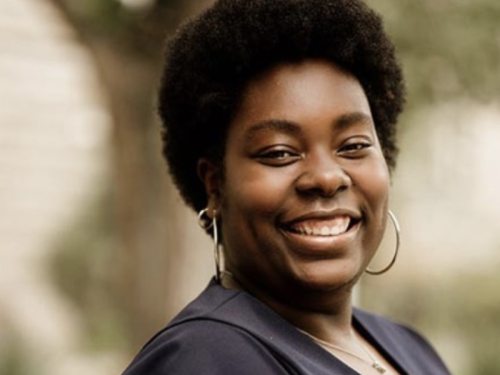GOLD Krewe Ambassador Spotlight: Angel Carter, PhD (SLA '19, SoPA *21, PHTM *24)
By Trevor Basehart and Mary-Elizabeth Lough, PhD

and a producer of Newcomb Institute’s annual feminist production Hers, Theirs, Ours (HTO)
08/01/2023
As a high school student, Angel Carter, PhD (SLA '18, SoPA *21, PHTM *24) chose Tulane for multiple reasons. First, though she was a lifelong Atlantan, she did not want to stay in Atlanta. Second, she heard the siren call of New Orleans.
“I chose the city of New Orleans because this city is truly one of the best in the world. The music, culture, and community were all reasons that I visited, and they are a huge part of the reason that I stayed after graduation,” says Carter.
Now a devoted Tulane alumna, with a BS in anthropology and a MPS in Homeland Security Studies, it was a decision she didn’t regret. “Tulane really excels in terms of flexible, yet rigorous academics and it allowed me to gain knowledge in two areas that I’ve always been obsessed with. I would describe my undergrad degrees as if you took every crime show ever created and merged it with the less dramatized tales of Indiana Jones. That intersection doesn’t exist in a lot of places, but it existed for me at Tulane.”
“I would describe my undergrad degrees as if you took every crime show ever created and merged it with the less dramatized tales of Indiana Jones. That intersection doesn’t exist in a lot of places, but it existed for me at Tulane.” — Angel Carter, PhD (SLA '18, SoPA *21, PHTM *24)
As a student, Carter was an admission intern, an alumni ambassador through Tower & Crescent, conducted research in a cell and molecular biology lab, served as a performer and producer for the Newcomb Institute’s annual show and served on many committees within the admissions office and president’s office.
Upon graduation, she had the tools and experience needed to transition from being a student leader on Tulane’s campus to being a GOLD Krewe and Tulane Alumni Association leader.
“Being a student leader allows you to have a breadth of experiences. You meet other students, learn to work with them, and then eventually put on events with them and, hopefully, they grow into your community and your friends. That’s also what being on the NOLA Club Board is like, so I felt very prepared.”
Today, she works at the National KIPP Foundation and serves as the director for the Goldberg Scholars Program for College and Career Success. In this role, Carter works in partnership with the Sandberg Goldberg Bernthal Family Foundation (SGBFF) to recruit, mentor, advise and support KIPP alumni through the scholars’ program and throughout their collegiate careers.
Before joining the National KIPP Foundation, Carter started her professional career in Tulane’s Office of Undergraduate Admission. She says, “There are a number of Tulane alums that work in the Office of Undergraduate Admission, and they all believed in me so much that they asked me to come join the team.” She adds that she was fortunate to be able to join the office as an admission counselor in the spring of 2019. Carter’s primary focus was Equity, Diversity, and Inclusion (EDI). “I was able to work with a wonderful team (shoutout to the JEDI Squad!) planning events, recruiting and supporting students from all over the world who were primarily BIPOC (Black, Indigenous, and people of color) and/or first-generation students,” says Carter.
“Even though I am no longer there, I am seeing the impact of that work in real-time, which has been the best feeling.”
Being an involved Tulanian even after graduation is important to her. “I have been able to continue to expand my network while also reconnecting with friends and exploring new places in the city. The experiences have been eye-opening and have meant a lot to me as I decide on my career and personal development.
“As a BIPOC woman from ATL, the future holds a lot for me. I see myself becoming strong in fields that focus on advocacy and equity. I see myself walking around and being called Dr. Angel Carter, and I hope to have conducted meaningful research in the field of public health that will then allow me to transition into working with community and global health equity organizations.”
